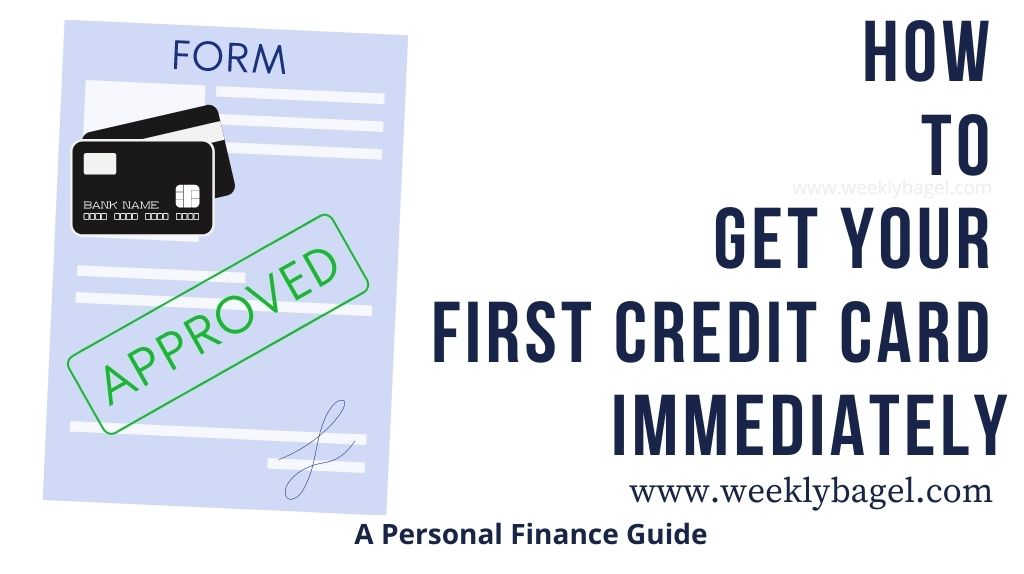Are you ready to build credit with a credit card?
It is quite simple to get a credit card. This is because credit card companies want you to have their cards, so they can make money. All you need to do is to prove to them, that you can pay back whatever you borrow for a transaction.

While I am an advocate for using credit card to build your credit score, I do not recommend owning one indefinitely. With that said, here is how to get a credit card.
What documents are needed to apply for a credit card?
All card issuers need the same basic legal documents from you. This is before they even consider your qualifications. Before you set out to apply for a credit card, you need to have these legal documents below:
1. You Need A Driver’s License
You need a driver’s license, before you set out to apply for a credit card. This is because it shows your age. Not only does it show your age, but also it proves you have a permanent residence where mails can be sent. This is important, because it proves you are not just passing through town.
So, what is the credit age?
The minimum age to get a credit card is 18. Also, this is minimum age for any authorized user of a credit card. What this means is you do not get one, until you are an adult. The financial industry does not considered ages below eighteen, financially matured to manage money.
In fact, it is difficulty to get approved for a card at the age of eighteen. This includes when you have a driver’s license. Naturally, you would think being eighteen and having a driver’s license suffice. But, this is not the case. Here is why.
2. You Need A Proof Of Employment
Issuers ask for proof of income or employment. Although some financial institutions do not do employment check, the Credit Card Act of 2009 requires them to consider your ability to afford one. This is one of the consumer protection Congressional Acts to protect you from predatory credit card companies.
Anyway, you need to take a proof of employment with you. This includes some paystubs of active employment. Or else, use other legal documents which indicate you earn money monthly. And, you will continue to earn money monthly after getting the credit card.
Is there a minimum income requirement to get a credit card?
No, there is no minimum income requirement, when applying for your first credit card. On the other hand, it is important to realize issuers will consider your debt to income ratio. What this means is a good annual income for a credit card, is one which pays ones monthly living expenses and debt without assistance.
Here is a good example.
Let us say your monthly income is $2300. You bring home about $1794 after a 22% tax deduction. Assuming your monthly living expenses add up to $1500, the remaining $294 tells an issuer two things.
Firstly, you have extra money left after paying your monthly expenses. Secondly, you can afford to pay back transactions not more than $294 monthly with their cards. This is important, since it determines whether you will get in debt or not. And, this is what the Credit Card Act of 2009 wants the credit card industry to consider when you try to set up an account.
3. You Need A Proof Of US Residency
The last thing a credit card institution wants, is to issue its card to foreign tourists. Not that foreign tourists cannot afford one, but the card industry try to issue to people with residence in the United States. That way, they can be reported to a credit bureau in case of non-payment of debt.
What is a credit bureau?
Well, it is a data collection organization which improves or screws your ability to borrow loans in the future. They collect and create what is called a credit history. When a credit history is created for you, a credit bureau assigns a score- credit score to it. This is a score which increases or decreases, depending on how good of a credit card user you are.
Financial institutions depend on credit history to determine your ability to qualify for loans.
This is why issuers need a proof of US residency- particularly your social security number or individual tax identification number. It ensures your credit history is accurately documented for future reference.
To put it another way, you will not qualify for a US financial institution credit card without a social security number or Individual Tax Identification Number (ITIN). So, be sure to have a proof of US residency with you.
4. Take Evidence Of A Huge Bank Savings With You
To get my first credit card, an evidence of a sizable bank savings did the trick. This was through my bank. Besides the annual salary amount I filled out on the form, I did not show any paystubs or employment history.
My bank just looked into my savings account. Then, they said I qualified. Finally, I was issued a card within 30 minutes after a series of agreement.
Not sure whether this works for all banks, but it worked very well in my case. Perhaps, it is because I have been trading with the bank for three years. Who knows!
To be sure, call your bank first to inquire. Big bank account speaks loudly. Generally speaking, it is better to apply for credit cards at your bank. This is because they have your banking history. Therefore, they know your ability to pay back debts.
How Important Does A Credit Score Affect Approval Of Credit Cards?
Card issuers care about your credit history. This is because it says whether you are a good investment or not for the companies. To reiterate, I mentioned financial institutions which issue cards are there to make money. And, they want to make sure you do not have a bad habit of paying back money.
Hence, why the companies check your credit score before giving you a card. So, what score do you need to get a credit card?

A credit score of 650 and above gives you a good chance. Otherwise, you have to make sure you meet the other requirements mentioned earlier. When I applied and got my first credit card, my credit score was below 650. Since I wanted to improve my credit score, I let my bank know it is why I was applying for the card.
All things considered, you can still apply for a credit card with bad score. When you are trying to get your credit score fixed, financial institutions are willing to help. But, the catch is a slightly higher interest than usual. This is why I recommend using your bank to get your first credit card, since they are there to help you.
What To Look For In A Credit Card
Picking the right credit card can be tricky. You cannot make mistakes in this stage. Or else, you will be stuck with a debt which increases monthly due to interest. There may even be some outrageous hidden credit card fees. This is what credit cards do, during non-payments.
They charge you interest, penalty fees and other attached fees. I am not trying to scare you. I just want you to know what a good credit card for beginners look like.
With that said, here are what to consider whenever you pick a credit card.
1. No Annual Interest For the First 6 to 15 Months
Some companies in the credit industry have promotional offers. Look for first time credit card offers. Remember the first card I got from my bank?
My bank did not charge me interest on it for nine months. This is because of a promotional offer it had going on. After promotional period, the usual interest returned.
When choosing your first credit card, I recommend going for companies who offer low or no interest promotions. By promotional offer, I refer to an offer which will not charge you interest for some months. You benefit two things from this offer.
Firstly, you can build your credit score quickly within promotional time period. Then, stop using your card. Secondly, it decreases your chances of going into debt. It takes about 10 months to get a fair to a good credit score, after consistent monthly payment.
If a credit card with no interest lasts for 6 months, you only get to pay 4 months of interests to get a good credit score. This is not bad at all. Also, do not be afraid to ask the issuing company about promotion offer. If they refuse you one, then consider this next approach.
2. Seek A Credit Card With No Maintenance Fees
The best credit card for starters like you, should not charge maintenance fees. Some companies in the industry charge monthly or annual maintenance fees. According the US Consumer Financial Protection Bureau report, maintenance fees and interest cost Americans $120 billion per year. The last thing you want is to be stuck with a card which charges you maintenance fees just for having it.
Further, it is important I mention there are credit cards which do not charge maintenance fees. Since you are getting a consumer lending product, feel free and compare credit cards. The industry is a very competitive one. You are sure to get a good one, with the criteria I mentioned earlier.
3. Low Processing Fees
Every time you attempt to buy something with your card, some merchants will charge you a processing fee. This is why it is important to look for a credit card with low processing fee. Usually, the average processing fee ranges from 1.3% to 3.5%.
Let me elaborate what this means for you, my good reader.
Say the cost of a transaction with your new card is $30, you will be charged $0.39 to $1.05 for the transaction to process. The fee amount used here is not consistent. However, it is the fees you may expect at such rates.
Maybe, these fees may not seem much. But, they increase with the cost of transactions. This is why it is important to get a credit card which charges a low processing fee.
4. Minimum Monthly Payments
This is a requirement for getting your first credit card. A minimum payment is needed, in case of your inability to repay any borrowed loans. If not, you would have to pay monthly, whatever the company arranges for you.
Why does this matter?
It matters, because paying the amount arranged for you may not financially convenient. Coupled with your monthly interest rate, this may end up creating a dent on your monthly budget. A minimum repayment ensures you get to pay in such a way, which does not disrupt your finances.
But, I must warn you. Minimum monthly payment also carries a risk. It stretches the time it takes for you to repay your credit card debt. Despite this, I still recommend you to get a card which allows you to do minimum payment. This is in case of financial emergency.
5. Cash Back Credit cards
Cash back cards will save you money. They return certain percentage of any amount you spend on transactions. If you are going to use your new credit card for repetitive transactions, I would recommend looking for a card with this feature.
Here is what I mean.
Some credit card companies refund some amount of money spent on gas. This is every time you pay for gas. Imagine how much this saves you each time.
While I am on this point, I want to point out that the cash back feature of a cash back card is different from a reward card- loyalty card. While the reward feature gives you points per transactions, the cash back feature actually credits back some amount of spent on a transaction.
Oh, did I mention loyalty cards take a long time to accumulate and require expenditure?
For the most part, avoid credit cards which promise a lot of crazy rewards or points. It will actually take you a very long time to accumulate enough points to use them for something. Hence, why a cash back card is better. There is less risk of a regret.
Altogether, the best card for young adults- particularly fellow working class adults, is a result of due diligence prior to application. Otherwise, there is a big risk of facing a huge debt down the line. Do your best to consider these things before a credit card application.
Things You Should Never Do With Your Credit Card
When you finally get your card, here are what you should not do with it:
1. Do Not Spend More than Credit Limit
You should not max out your card. This is because of what happens when you max out a credit card. You will get an increase in interest rate, penalty charges or even a decrease on your credit score. So, be sure to keep expenditures to about 30% of credit limit.
2. Never Stopping Back Monthly Debt
Try to be on top of your debt. Credit card debts are no joke. This is because they accumulate monthly, regardless of expenditures or no expenditures. As long as your debt is not zero, your debt will always accumulate interest which adds to overall debt.
You can read about what happens if you stop paying your credit card debt, so you can have an idea of how much your life can get messed up.
3. Do Not Ignore Unknown Charges
Unknown charges may be a sign of your card getting compromised. If you ever see a transaction you did not do on your statement, dispute the credit card charges. If not, the card issuer will assume it was an authorized transaction.
You will be charged the interest rate on the purchase. Usually, an issuer will remove the transaction if you can prove it is fraud. I wrote how you could win the dispute on the article above. Otherwise, you will be made to pay back the debt and its generated interest. Hence, why it is importance to inform your card issuer of unauthorized charges on your card.
4. Do Not Get More Than One Card
How many credit cards are too many, my dear reader?
I consider more than one card as too many. This is especially, when you are building a credit history for the first. No American working young adult has a business owing a credit card, unless it is for building up his or her credit history. Having a single card could easily do that for you.
Besides, your choices of maxing out a credit card decrease significantly when you do not have access to more than one card. Do you agree?
If you are curious about what not to do with your credit card, I wrote an article on it. On the article, I elaborated more on the subject. As a first time credit card user, it will do your some good to read it. This is because it would help you not fall prey to the predatory practices of some card issuers.




 How To Save Money On Gas For Your Car Now
How To Save Money On Gas For Your Car Now